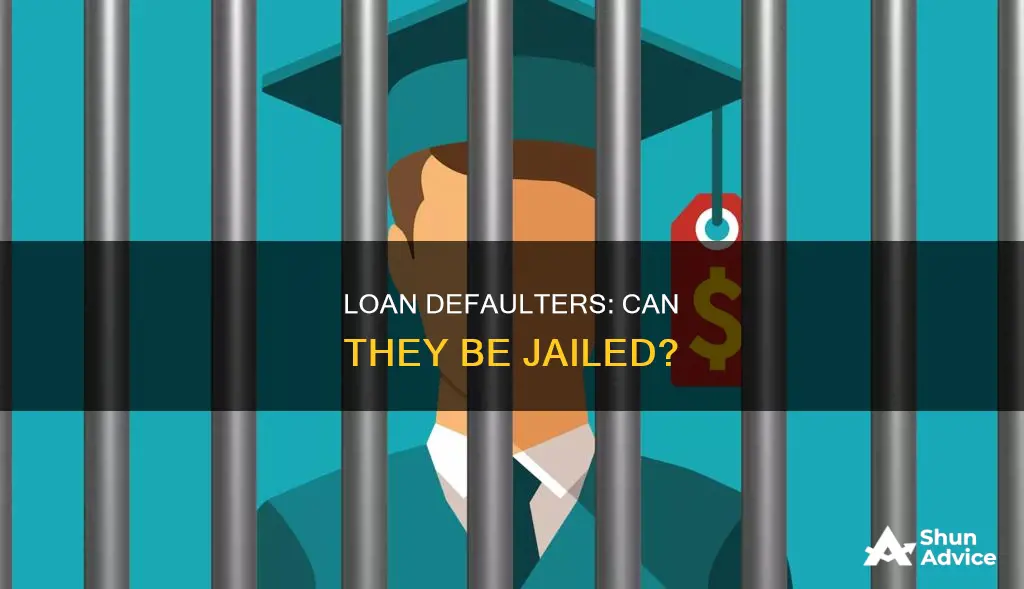
Defaulting on a loan can have serious financial consequences, but imprisonment is not a direct result of failing to repay a loan. While defaulting on a loan is considered a civil offence, criminal charges are not usually applied, and debtors' prisons were abolished in the 1830s when the US Supreme Court ruled that jail time for debt was unconstitutional. However, if a court finds you in contempt due to processes related to the judgment, you may face jail time.
| Characteristics | Values |
|---|---|
| Can a loan defaulter go to jail? | No, it is illegal to jail people for debt |
| What happens when you default on a loan? | Your credit score will drop significantly, making it difficult to secure loans, credit cards, and even rent apartments in the future. |
| What are the other repercussions? | Additional penalties and late fees are added to the outstanding amount, escalating your financial burden. The creditor can also garnish your wages or seize your assets. |
| What should you do if you are unable to repay a loan? | It is advisable to engage in negotiations with the lender. Established rules and procedures exist for cases where defaulters have valid reasons for their inability to repay. |
What You'll Learn

Loan defaulters do not go to jail
When an individual fails to repay a personal loan on time, they face the risk of becoming a defaulter, which can have significant financial repercussions. Firstly, the lender will issue a formal notification or notice, reminding the borrower of the defaulted payments and the loan agreement terms. This is the initial alert that a payment has been missed and serves as a warning to prevent further escalation. If the borrower fails to respond or rectify the situation, the lender can proceed with various legal actions.
One possible consequence of loan default is the attachment of wages or bank accounts, further complicating the borrower's financial situation. The lender may obtain a judgment against the borrower, giving them the legal right to garnish wages, place liens on property, or seize assets to recover the outstanding debt. Additionally, there may be penalties and late fees incorporated into the outstanding amount, further increasing the financial burden.
Another significant repercussion of loan default is the impact on the borrower's credit score. A falling credit score can lead to higher interest rates on future loans, making it difficult to secure housing, insurance, or even employment in certain sectors. It can take years to rebuild a credit score, and during this time, the borrower may face challenges in obtaining new credit or loans due to their tarnished financial record.
It is important to note that imprisonment is not a direct consequence of loan default. However, if there is intentional default or disregard for the law, established rules and procedures may not provide leniency. In India, for example, a defaulter may be booked under Section 420 of the Indian Penal Code, which involves imprisonment. Additionally, as per the Reserve Bank of India (RBI) guidelines, if a borrower's post-dated cheques bounce, they can be charged as a criminal under Section 138 of the Negotiable Instruments Act of 1881.
Lending Tree's Construction Loan Options: What You Need to Know
You may want to see also

Lenders must follow fair recovery processes
While defaulting on a loan can have serious financial repercussions, imprisonment is not a direct consequence. It is considered a civil offence, and criminal charges are not usually applied. However, lenders can take legal action, and it is within their rights to seize assets and garnish wages to recover the debt.
In the United States, the Fair Debt Collection Practices Act (FDCPA) offers consumers protection from illegal and unethical tactics by debt collection services. Under the FDCPA, debt collectors are prohibited from:
- Calling an unreasonable number of times, such as before 8 a.m. or after 9 p.m., or contacting the debtor at their place of employment if their supervisor disapproves
- Disclosing information about the debtor's debts to uninvolved third parties
- Using harassing, profane, or accusatory language
- Misrepresenting factual information surrounding the debt or threatening to communicate false credit information
- Making further contact after a Cease-and-Desist Letter has been sent
The FDCPA also outlines specific requirements for debt collectors, such as sending a written communication or 'dunning letter' that includes several pieces of information.
Overall, fair recovery processes are essential to maintain positive customer relationships and ensure timely payments.
Lending Club: Understanding the Loan Denial Factors
You may want to see also

Loan restructuring is encouraged
Defaulting on a loan can have serious financial repercussions, including additional penalties and late fees, a damaged credit score, and the seizure of assets. However, imprisonment is not a direct consequence for loan defaulters, as defaulting on a loan is considered a civil offence, and criminal charges are not typically applied.
Loan restructuring can benefit both the debtor and the creditor. For the debtor, it can provide debt relief and help them avoid bankruptcy. It can also be a less expensive alternative to insolvency. For the creditor, it increases the chances of receiving repayment and earning more money than they would in a bankruptcy proceeding.
If you are struggling to make payments on your loan, it is important to engage in negotiations with your lender. Lenders may be willing to renegotiate the loan terms to find a mutually beneficial solution. They may offer temporary relief measures such as payment holidays or a temporary hardship program that allows you to skip several payments. It is advisable to take early warnings and communications from your lender seriously and respond proactively to prevent further escalation and potential legal proceedings.
LendKey Loans: Pellissippi State Community College Eligibility
You may want to see also

Defaulting on a loan has serious financial consequences
One of the significant repercussions of defaulting on a loan is the escalation of your financial burden. Additional penalties, late fees, and interest charges are incorporated into your outstanding amount, further exacerbating your financial obligations. Your credit score will also take a significant hit, impacting your ability to rent housing, get insurance, secure employment in some sectors, or obtain future credit or loans. It can take years to rebuild a credit score.
Beyond the financial consequences, defaulting on a loan can also lead to legal action from the lender. This may include the attachment of wages, further complicating your financial situation. The lender can also seize any collateral pledged against the loan, including assets, income-generating ventures, or investments tied to the loan. In some cases, the lender may file a lawsuit against the borrower, which, if ruled in favor of the lender, can result in garnished wages, liens on property, or the seizure of other valuable assets to recover the outstanding debt.
It is important to note that imprisonment is not a direct consequence of loan default. Defaulting on a loan is considered a civil offence, and criminal charges are not typically applied. However, it is advisable to engage in negotiations with the lender and seek their established procedures for handling cases where defaulters have valid reasons for their inability to repay. Maintaining open communication with your lender and proactively addressing financial difficulties can help mitigate the serious financial consequences of loan default.
Lending Club Loan App: What You Need to Know
You may want to see also

Legal action against loan defaulters
Defaulting on a loan can have serious financial consequences, and while imprisonment is not a direct consequence, it is still important to understand the legal implications and repercussions of defaulting on a loan.
Firstly, lenders must follow a fair recovery process, respecting the borrower's dignity and prohibiting abusive practices. This includes ensuring that debt collection efforts do not embarrass or unduly harass the borrower, both in private and public spheres. Before taking any legal action, the borrower must be given a notice period to either dispute the claimed debt or arrange for its repayment. This notice period is intended to ensure that legal action is a last resort rather than a first response. During this time, the borrower may receive reminders and notices regarding late payments.
If the borrower fails to respond or rectify the situation, the lender can seize the collateral pledged against the loan. This process is often governed by the terms outlined in the loan agreement. The lender can also file a civil lawsuit against the borrower, which, if ruled in favour of the lender, grants them the legal right to garnish the borrower's wages, place liens on their property, or seize other valuable assets to recover the outstanding debt. It is important to note that the specific legal action taken may vary depending on the jurisdiction and the loan agreement terms of the lender.
To avoid legal action, borrowers are advised to maintain open lines of communication with their lenders to discuss their financial situation and explore negotiation and settlement options. Lenders may be willing to renegotiate loan terms, including extending the loan period, reducing interest rates, or pausing payments.
LendingTree's Consolidation Loans: What You Need to Know
You may want to see also
Frequently asked questions
Defaulting on a loan can have serious repercussions, including additional penalties and late fees, a damaged credit score, and legal action. Lenders will often be willing to work with borrowers to avoid default, so it is important to communicate with them.
In India, loan default is a civil offence, not a criminal one, and defaulters do not usually go to jail. However, defaulters may face imprisonment under section 420 of the Indian Penal Code, or if their cheques bounce, as stated under section 138 of the Negotiable Instruments Act of 1881.
Lenders can employ debt collection agencies, negotiate new repayment plans, file a lawsuit, or seize assets through court orders. Before taking legal action, lenders must adhere to RBI guidelines, which emphasise fair practices, transparency, and respectful communication.
If you are struggling to make payments, it is important to communicate with your lender, who may be able to offer relief options such as deferment or forbearance. Debt consolidation may also be an option if you have a good credit score.







